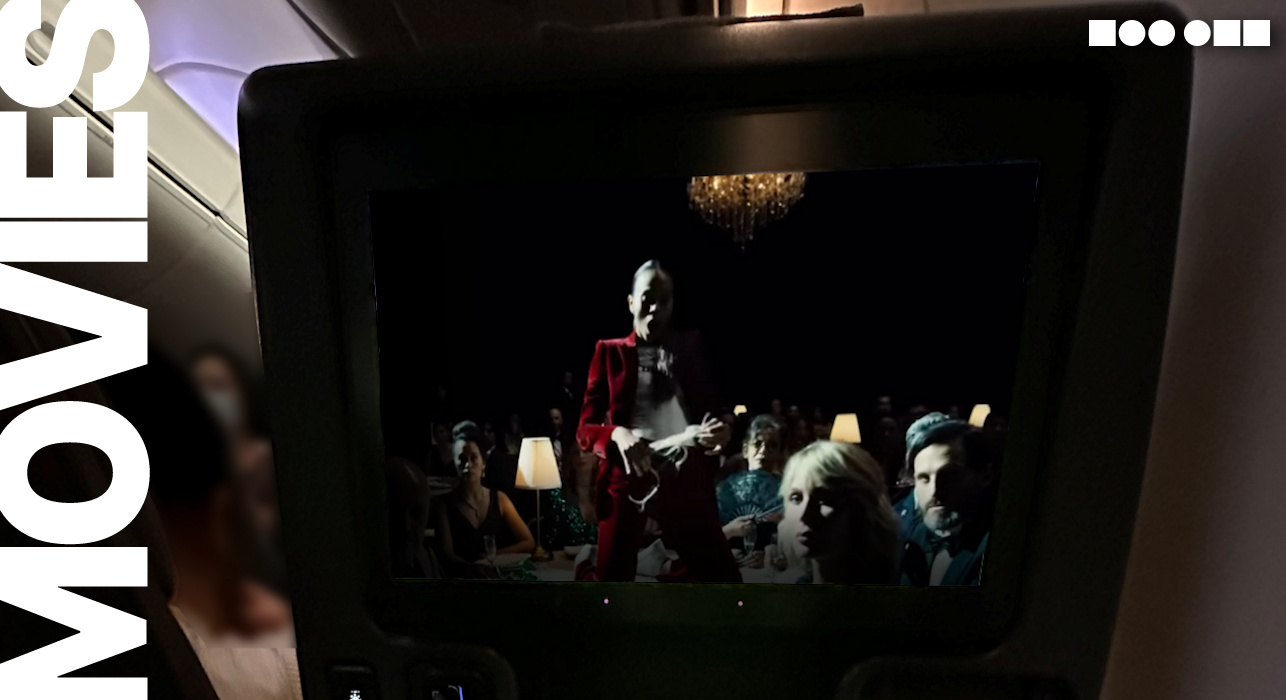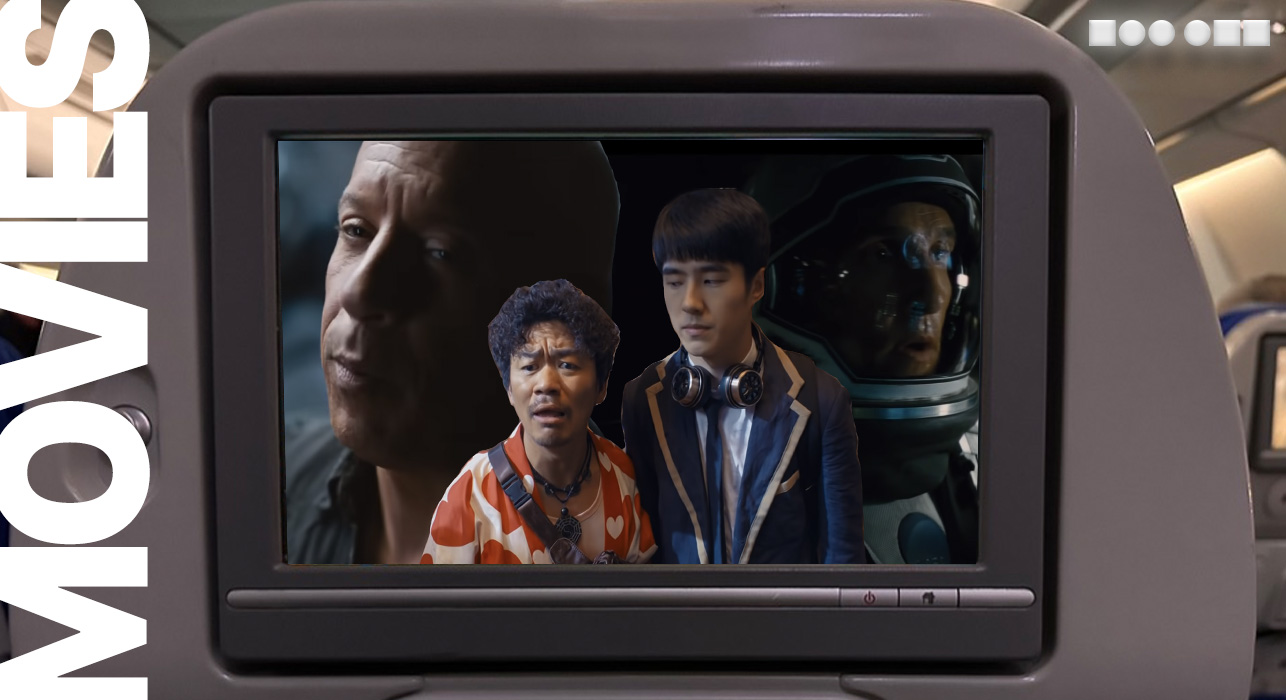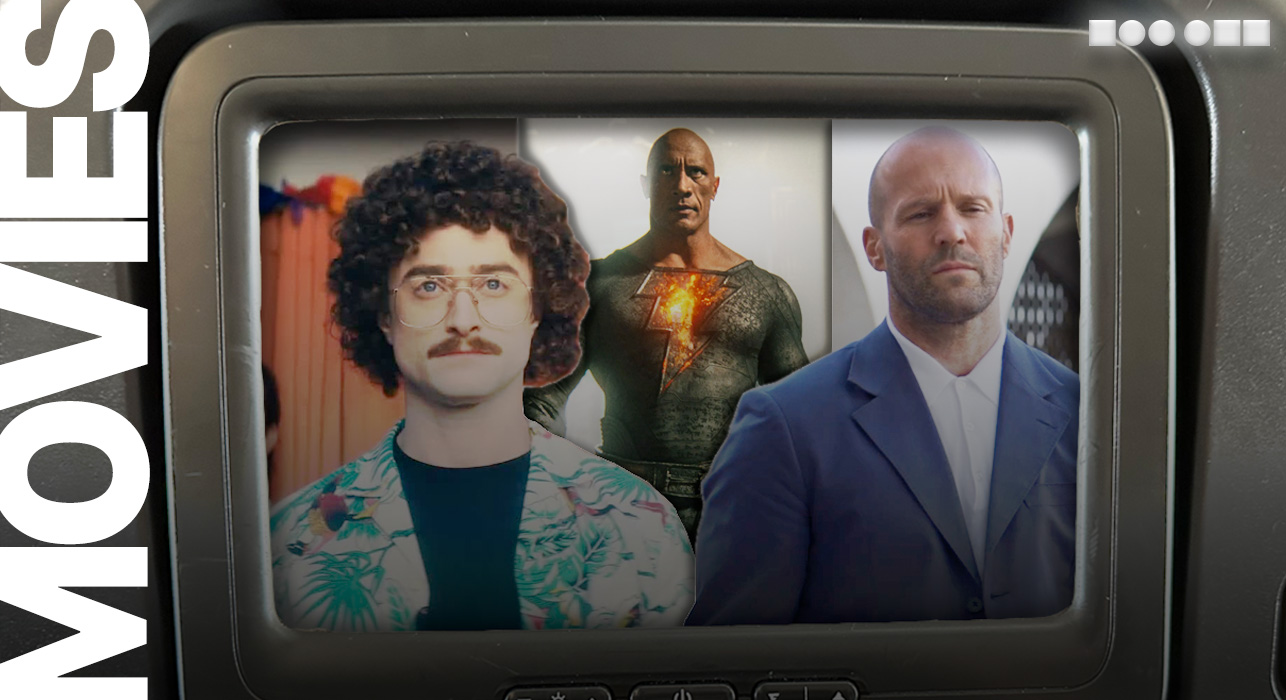Long-haul flights might not be the best way of experiencing cinema, but they are a great way of catching up on movies that weren’t quite important enough to warrant a full $20 ticket purchase. So here’s two movies that were just… kind of… there, along with one movie that demanded my attention, perhaps more for its notoriety than its quality.
Note that all of these films were viewed on Singapore Airlines flights in February 2025. I’m not seeing them as the directors intended; they are on small screens, with sub-optimal sound despite my headphones’ best efforts, and may have been edited for content. And some edits are better than others.
Wolfs (M15)

Wolfs is almost the quintessential Apple TV+ production: a neat idea, some star power, not really enough to prompt you to drop a tenner on a subscription, but a perfectly fine way to waste two hours if you’ve already paid for the service (or in my case, the flight) and have nothing else to do. (I did have an Apple TV+ subscription for a few months; a free trial from when I got my most recent iPhone. I think I used it to watch one movie in total – Tetris, the slighly-exaggerated story of the game’s late-1980s Western release – before dropping it.)
George Clooney and Brad Pitt play unnamed ‘fixers’, paid to make extraordinary problems (read: evidence of crimes) go away. When a local attorney calls with a problem – that is to say, a dead half-naked man in her hotel room – the attorney hires Clooney and the (unseen) hotel manager calls Pitt, even though they have never met and insist on working alone. From there, the film follows the pair for the rest of the night as they begrudgingly work together to dispose of an increasingly-not-dead body, and uncover how and why he was there in the first place.
Wolfs is the very definition of a movie that’s just ‘there’. Clooney and Pitt have worked together long enough that they’ll always have some onscreen chemistry, and the movie moves along at a decent pace. But it’s just… fine, neither memorable enough to get an unqualified recommendation, nor terrible enough for derision. It’s a Perfectly Acceptable Long-Haul Airline Movie.
Venom: The Last Dance (M15)

From ‘perfectly acceptable airline movie’ to ‘perfectly acceptable alien movie’. Venom: The Last Dance ends the Venom trilogy; Eddie (Tom Hardy) is on the run after the events of Venom: Let There Be Carnage, and the symbiote alien Venom that lives within Eddie’s body is being hunted by its creator, Knull. See, it turns out that Venom has the key to unlocking the prison in which Knull is trapped, and Knull has sent an army of aliens called xenophages to find it, and if they work out it’s on Earth then there’s a large-scale alien invasion on the way.
Eddie and Venom make plans to head to New York to blackmail a judge and clear his name, but they make it as far as Las Vegas before a xenophage picks up their trail. Luckily, the US military are in the process of decommissioning the nearby Area 51 base, providing us with a convenient way of getting Eddie captured, and a way of having alien-invasion-ready troops on hand once Knull’s reinforcements arrive.
Beyond that, it’s a Marvel movie, or at least a Sony Marvel movie. There’s large-scale fight scenes, plucky comic relief characters that deliver plot-crucial details and need later rescuing, and the inevitable post-credits ‘stinger’ to set up a continuing story in the Sony-Marvel-verse… assuming there’s any ongoing interest in those films, outside getting more Venom. The Last Dance gets a ‘not actively offensive to the senses’ out of 10.
Emilia Pérez (MA15+)

Heading into the 2025 awards season Emilia Pérez was almost better known for the controversy surrounding it, rather than for the merits of the film itself. The film was criticised for portraying a stereotypical view of Mexican life, focusing on crime and drug cartels, as well as not having Mexican actors playing key roles; only one of the four main Spanish-speaking roles is played by an actual Mexican citizen. It wasn’t even shot in Mexico; the movie was directed by a Frenchman, Jacques Audiard, and largely filmed in France.
It didn’t help matters when old tweets by lead actor Karla Sofía Gascón surfaced, with Islamophobic and racist content. Her X account was deleted the next day, but by that stage Gascón had been removed from promotional material for the film, despite her nomination for an Oscar for Best Actress. Even the premise of the film has its own issues; a man undergoes gender transition surgery in an attempt to ditch his past, which didn’t endear the movie to LGBT viewers.
Rita (Zoe Saldaña, who won an Oscar as Best Supporting Actress) is a lawyer hired by Manitas (Gascón), leader of a drug cartel; Manitas says he wants to transition to being a woman, and tasks Rita with finding a doctor to discreetly perform the procedure. (Gascón is a trans woman in real life.) He doesn’t tell his wife or children, faking his death and instructing Rita to ensure his family’s safety abroad.
Manitas – now Emilia – can’t completely sever ties with the past. Emilia catches up with Rita years later, looking to reunite with her family and right the wrongs of her past. While Emilia gains public adulation by starting a non-profit, using her wealth and connections to find the remains of victims of crime, Rita arranges for his ‘widow’ (Jessi, played by Selena Gomez) and children to move in with Emilia in Mexico City. But Jessi has moved on. Can Emilia?
Hinted at in the trailer is that the film is a musical, featuring dance routines and original music. If you hear ‘musical’ and think happy, upbeat show tunes, this is not it; Emilia Pérez is dark, its songs dealing with loss, corruption, gender dysphoria and wrestling with one’s conscience. Some of the dance numbers are quite inventive, with one (featured in the trailer) of a gang rhythmically loading and preparing their guns, and another – El Mal, which would win an Oscar for Best Original Song – featuring Saldaña’s character mocking Emilia’s rich and corrupt donors.

But while Rita mocks the rich elite, the characters don’t necessarily have much to redeem themselves. Emilia is arguably trying to atone for past sins, but never quite fully adopts her new role as champion of the innocent… or that of ‘aunt’ to her children. And Rita is efficient at her job and loyal to her boss, but ultimately if the boss is a bad person, then Rita is just a henchman collecting a paycheck. Only one character is portrayed as fully wholesome, and even that character is prepared for violence if things don’t go their way.
I liked the film on first watch – it’s striking, and the performances from Gascón and Saldaña in the lead roles are spectacular. But looking back at it, I’m not sure what it was trying to say, nor am I particularly ready to rave about it to others; without wanting to spoil much, the ending is a little unsatisfying. And I’m certainly not qualified to speak on Mexican or transgender culture, so I have to watch it as a straight cis white English-speaking dude, and judge it accordingly. It’s worth a look given the attention and the award nominations it garnered, and I’m glad I invested the time, but it’s a reserved recommendation at best.





